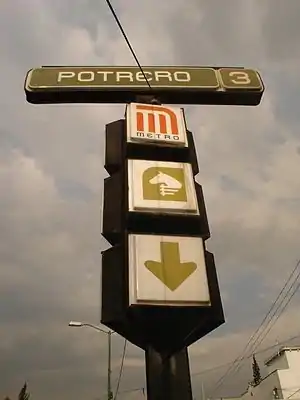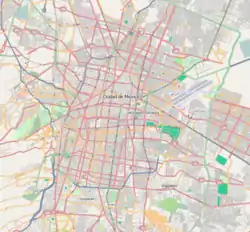Potrero metro station[lower-alpha 1] is a station of the Mexico City Metro built along Insurgentes Norte Avenue in the colonias (neighborhoods) of Capultitlan and Guadalupe Insurgentes, in Gustavo A. Madero, Mexico City. It is an at-grade station with one island platform served by Line 3 (the Olive Line) between Deportivo 18 de Marzo and La Raza stations. The station and its surrounding area are named this way because there used to be a hippodrome during the Porfiriato era (1876–1911) and its pictogram features the silhouette of a head of a horse behind a fence. The station was opened on 1 December 1979, on the first day of service between Indios Verdes and Hospital General metro stations.
In 2019, the station had an average daily ridership of 17,308 passengers, making it the 106th busiest station in the network and the third-least used in the line. The facilities are partially accessible to people with disabilities as it is equipped with access ramps.
Location and layout
_1.jpg.webp)
Potrero is a metro station located along Insurgentes Norte Avenue, in Gustavo A. Madero, Mexico City.[2] The station serves the colonias (Mexican Spanish for "neighborhood") of Capultitlan and Guadalupe Insurgentes. Within the system, it is found between Deportivo 18 de Marzo and La Raza stations.[2]
Potrero metro station is serviced by a transport hub called Centro de transferencia modal (CETRAM),[3] whose size is 6,614 square meters (71,190 sq ft).[4] From there, commuters can ride different routes and transport methods, including Routes 25 and 104 of the Red de Transporte de Pasajeros (RTP) system and Route 15-C of the public bus system.[5][6] It is serviced by Line 1 of the Metrobús service at Potrero bus station.[7]
Exits
There are four exits:[2]
- Northeast: Insurgentes Norte Avenue and Victoria Avenue, Guadalupe Insurgentes.
- Northwest: Insurgentes Norte Avenue and Poniente 116, Capultitlan.
- Southeast: Insurgentes Norte Avenue and Excélsior Street, Guadalupe Insurgentes.
- Northwest: Insurgentes Norte Avenue and Poniente 112, Capultitlan.
History and construction
Line 3 of the Mexico City Metro was built by Ingeniería de Sistemas de Transportes Metropolitano, Electrometro, and Cometro, the latter a subsidiary of Empresas ICA;[8] Potrero metro station opened on 1 December 1979, on the first day of the Indios Verdes–Hospital General service.[9] The station was built at grade level. The Potrero–La Raza stretch goes from the street level to the underground one[10] and its length is 1,106 meters (3,629 ft). Northbound, the Deportivo 18 de Marzo–Potrero section is 966 m (3,169 ft) long.[11] Horse, mammoth, fish and bird remains were found during its construction.[12]
Potrero station has a partially disabled-accessible service with access ramps.[2] The station's pictogram features the silhouette of a head of a horse behind a fence. The station and its surrounding area are named this way because there used to be a hippodrome during the Porfiriato era (1876–1911; Ex Hipódromo de Peralvillo in modern times); its paddocks were found in its northern zone.[2]
Incidents
On 14 December 2018, a private vehicle crashed into the Insurgentes Norte and Victoria entrance's walls after it was impacted by a public bus with no injuries reported.[13] On 19 July 2021, a man was stabbed and killed in the CETRAM's corridors in an apparent robbery.[14] On 7 January 2023, two trains crashed inside the Potrero–La Raza interstation tunnel while both were going toward Indios Verdes metro station; one person was killed and 106 resulted injured.[15]
Ridership
According to the data provided by the authorities since the 2000s, and before the impact of the COVID-19 pandemic on public transport, commuters averaged per year between 17,100 and 21,700 daily entrances between 2013 and 2019; the station had a ridership of 6,317,545 passengers in 2019,[16] which was an increase of 48,482 passengers compared to 2018.[17] Also in 2019, Potrero metro station was the 106th busiest station of the system's 195 stations, and it was the line's third-least used.[16]
| Annual passenger ridership | |||||
|---|---|---|---|---|---|
| Year | Ridership | Average daily | Rank | % change | Ref. |
| 2022 | 4,290,556 | 11,754 | 101/195 | +43.08% | [1] |
| 2021 | 2,998,686 | 8,215 | 108/195 | −17.00% | [18] |
| 2020 | 3,612,909 | 9,871 | 103/195 | −42.81% | [19] |
| 2019 | 6,317,545 | 17,308 | 106/195 | +0.77% | [16] |
| 2018 | 6,269,063 | 17,175 | 106/195 | −2.37% | [17] |
| 2017 | 6,421,265 | 17,592 | 104/195 | −8.06% | [20] |
| 2016 | 6,984,359 | 19,082 | 93/195 | −5.42% | [21] |
| 2015 | 7,384,471 | 20,231 | 87/195 | +2.79% | [22] |
| 2014 | 7,184,004 | 19,682 | 92/195 | −9.20% | [23] |
| 2013 | 7,911,896 | 21,676 | 83/195 | −15.15% | [24] |
Notes
References
- 1 2 3 "Afluencia de estación por línea 2022" [Station traffic per line 2022] (in Spanish). Sistema Transporte Colectivo Metro. 2023. Archived from the original on 5 March 2023. Retrieved 5 March 2023.
- 1 2 3 4 5 "Potrero" (in Spanish). Sistema de Transporte Colectivo Metro. Archived from the original on 26 January 2022. Retrieved 24 March 2022.
- ↑ Romero Sánchez, Gabriela; González Alvarado, Rocío (28 August 2016). "Busca gobierno convertir paradero de Indios Verdes en un Cetram" [Government aims to convert Indios Verdes bus stop into a CETRAM]. La Jornada (in Spanish). Retrieved 26 March 2022.
- ↑ Domínguez Prieto, Olivia (2010). Trovadores posmodernos: músicos en el Sistema de Transporte Colectivo metro (in Spanish). National Autonomous University of Mexico. p. 83. ISBN 978-607-02-1451-6.
- ↑ "Red de Rutas" [Routes network] (in Spanish). Red de Transporte de Pasajeros. Archived from the original on 6 November 2021. Retrieved 30 October 2021.
- ↑ "Red de corredores" [Route network] (in Spanish). Retrieved 30 October 2021.
- ↑ "Línea 1: significado de estaciones" [Line 1: meaning of stations] (in Spanish). Mexico City Metrobús. Archived from the original on 10 September 2019. Retrieved 26 March 2022.
- ↑ "Línea 3, Ciudad de México" [Line 3, Mexico City] (in Spanish). iNGENET Infraestructura. 20 July 2009. Archived from the original on 10 September 2014. Retrieved 8 May 2020.
- ↑ Transporte: Seis años de esfuerzo conjunto (in Spanish). Vol. I. Government of the Federal District Department. 1987. p. 17. Archived from the original on 29 October 2021. Retrieved 27 January 2022.
- ↑ Mora, Karla (10 July 2019). "Por mantenimiento, cerrarán 4 estaciones de la Línea 3 del Metro" [4 metro stations on Line 3 will be closed for maintenance]. La Razón (in Spanish). Archived from the original on 11 July 2019. Retrieved 23 November 2020.
- ↑ "Longitud de estación a estación por línea" [Station-to-station length per line] (in Spanish). Sistema de Transporte Colectivo Metro. Archived from the original on 4 May 2021. Retrieved 12 July 2021.
- ↑ Sánchez Vázquez, Ma. de Jesús; Mena Cruz, Alberto; Carballal Staedtler, Margarita (2010). "Investigación Arqueológica en la Construcción del Metro" [Archaeological Research in the Construction of the Metro] (PDF) (in Spanish). Mexico City: Instituto Nacional de Antropología e Historia. Archived (PDF) from the original on 9 July 2020. Retrieved 9 July 2020.
- ↑ "Automovilista destruye entrada de la estación del Metro Potrero (VIDEO)" [Motorist destroys entrance of Potrero metro station (VIDEO)]. Reporte Índigo (in Spanish). 14 December 2018. Retrieved 26 March 2022.
- ↑ "Asesinan a hombre afuera de la estación del Metro Potrero; no hay detenidos" [Man murdered outside Potrero metro station; there are no detainees]. Reporte Índigo (in Spanish). 19 July 2021. Retrieved 26 March 2022.
- ↑ Ferri, Pablo (8 January 2022). "El Gobierno de Ciudad de México eleva el número de heridos del accidente del metro a 106" [Mexico City government raises number of injured in subway accident to 106]. El País (in Spanish). Archived from the original on 14 January 2023. Retrieved 15 January 2023.
- 1 2 3 "Afluencia de estación por línea 2019" [Station traffic per line 2019] (in Spanish). Sistema Transporte Colectivo Metro. 2020. Archived from the original on 8 April 2020. Retrieved 3 May 2020.
- 1 2 "Afluencia de estación por línea 2018" [Station traffic per line 2018] (in Spanish). Sistema Transporte Colectivo Metro. 2019. Archived from the original on 6 June 2019. Retrieved 7 April 2020.
- ↑ "Afluencia de estación por línea 2021" [Station traffic per line 2021] (in Spanish). Sistema Transporte Colectivo Metro. 2022. Archived from the original on 7 March 2022. Retrieved 7 March 2022.
- ↑ "Afluencia de estación por línea 2020" [Station traffic per line 2020] (in Spanish). Sistema Transporte Colectivo Metro. 2021. Archived from the original on 21 June 2021. Retrieved 21 June 2021.
- ↑ "Afluencia de estación por línea 2017" [Station traffic per line 2017] (in Spanish). Sistema Transporte Colectivo Metro. 2019. Archived from the original on 3 May 2020. Retrieved 3 May 2020.
- ↑ "Afluencia de estación por línea 2016" [Station traffic per line 2016] (in Spanish). Sistema Transporte Colectivo Metro. 2017. Archived from the original on 3 May 2020. Retrieved 3 May 2020.
- ↑ "Afluencia de estación por línea 2015" [Station traffic per line 2015] (in Spanish). Sistema Transporte Colectivo Metro. 2016. Archived from the original on 3 May 2020. Retrieved 6 May 2020.
- ↑ "Afluencia de estación por línea 2014" [Station traffic per line 2014] (in Spanish). Sistema Transporte Colectivo Metro. 2015. Archived from the original on 3 May 2020. Retrieved 6 May 2020.
- ↑ "Afluencia de estación por línea 2013" [Station traffic per line 2013] (in Spanish). Sistema Transporte Colectivo Metro. 2014. Archived from the original on 3 May 2020. Retrieved 6 May 2020.
External links
 Media related to Potrero (station) at Wikimedia Commons
Media related to Potrero (station) at Wikimedia Commons The dictionary definition of potrero at Wiktionary
The dictionary definition of potrero at Wiktionary- "Metro Potrero". At the Official Guide to Mexico City.

